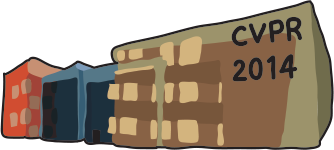-
Discriminative Feature-to-Point Matching in Image-Based Localization
AbstractThe prevalent approach to image-based localization is matching interest points detected in the query image to a sparse 3D point cloud representing the known world. The obtained correspondences are then used to recover a precise camera pose. The state-of-the-art in this field often ignores the availability of a set of 2D descriptors per 3D point, for example by representing each 3D point by only its centroid. In this paper we demonstrate that these sets contain useful information that can be exploited by formulating matching as a discriminative classification problem. Since memory demands and computational complexity are crucial in such a setup, we base our algorithm on the efficient and effective random fern principle. We propose an extension which projects features to fern-specific embedding spaces, which yields improved matching rates in short runtime. Experiments first show that our novel formulation provides improved matching performance in comparison to the standard nearest neighbor approach and that we outperform related randomization methods in our localization scenario.
Related Material
[pdf][bibtex]@InProceedings{Donoser_2014_CVPR,
author = {Donoser, Michael and Schmalstieg, Dieter},
title = {Discriminative Feature-to-Point Matching in Image-Based Localization},
booktitle = {Proceedings of the IEEE Conference on Computer Vision and Pattern Recognition (CVPR)},
month = {June},
year = {2014}
}
These CVPR 2014 papers are the Open Access versions, provided by the Computer Vision Foundation.
Except for the watermark, they are identical to the accepted versions; the final published version of the proceedings is available on IEEE Xplore.
Except for the watermark, they are identical to the accepted versions; the final published version of the proceedings is available on IEEE Xplore.
This material is presented to ensure timely dissemination of scholarly and technical work.
Copyright and all rights therein are retained by authors or by other copyright holders.
All persons copying this information are expected to adhere to the terms and constraints invoked by each author's copyright.

